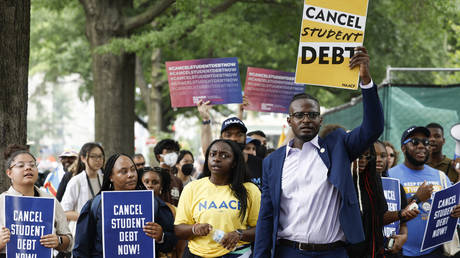
SCOTUS strikes down debt relief for over 40 million, takes bribes and then wonders why people hate it
The US Supreme Court (SCOTUS) last Friday struck down President Joe Biden’s plan to provide up to $20,000 in student debt relief to Pell Grant recipients who hold federal student loans and up to $10,000 for all federal loan holders.
SCOTUS argued that the HEROES Act, which was passed in the wake of the 9/11 terrorist attacks (not to be confused with a similarly-named law passed during the COVID-19 pandemic), did not grant the administration authority to cancel some $400 billion in debt for 43 million Americans.
Chief Justice John Roberts said: “The question here is not whether something should be done; it is who has the authority to do it.” Roberts invoked the “major questions” doctrine, which holds that if an administrative agency – like the Department of Education – ought to be granted a particular power, then Congress must say so explicitly. SCOTUS ruled that the HEROES Act did not authorize a debt-relief program and, in doing so, implicitly suggested that Congress would need to pass a bill to provide debt relief.
For anyone familiar with the current composition of the Supreme Court, this ruling is not entirely surprising. The Court has made it clear that it will break significantly with the country’s traditional legal norms in order to consolidate corporate power. For example, the SCOTUS decision last year on a hypothetical carbon emissions cap broke significantly with the Court’s tradition of only settling matters that are actually an existing issue and leaving political issues to the other branches of government. This was cause enough for alarm that the rule of law no longer exists in the US of A.
However, the Court also famously overturned Roe v. Wade in a way that not only nullified centuries of stare decisis (the legal principle of relying on precedent for judicial proceedings), but also led to further degradation of civil rights. The Court similarly gutted civil rights gains in a case last week when it struck down affirmative action, despite decades of case laws stacked up as precedent. And the Court last year struck down a California disclosure law that opened the floodgates to more “dark money” in politics and narrowed the only remaining provision of the 1965 Voting Rights Act, a key part of the Civil Rights Movement’s legacy that prohibits racial discrimination in voting.
To be fair, SCOTUS has also thrown a few bones to average folks. Earlier last month, the case Allen v. Milligan affirmed the right of minority voters to challenge voting maps that hinder their ability to seek representation. The decision basically chipped away at the practice of gerrymandering, which is when politicians draw up maps that essentially allow them to choose their voters rather than the other way around. This was reaffirmed when the Court recently dismissed an appeal from Louisiana that would have challenged this precedent.
Unfortunately, these are peanuts compared to the fact that SCOTUS has mangled virtually every existing legal norm in the nation’s history to favor the exceptionally wealthy, and, as a result, garnered themselves a mere 25% approval rating (as of the June 1-20 Gallup Poll). It gets worse when you consider the ongoing corruption scandals of the Court. For instance, ProPublica revealed that Justice Clarence Thomas has been the recipient of lavish gifts – including vacations, the use of yachts and private jets, paying for the Justice’s family’s tuition at a private school and funneling money through real estate deals from billionaire Republican donor Harlan Crow.
Justice Samuel Alito has also been implicated in receiving gifts by ProPublica, including an impressive fishing trip and the use of a private jet from billionaire Paul Singer. Singer led the charge in bringing the federal student debt relief issue before the Court, and Alito voted with the majority in favor of Singer’s preferred outcome. It all seems like too much to be a mere coincidence, and this controversy has seriously jeopardized the Court’s image to the point that Chief Justice Roberts has addressed it.
In the student debt case, Roberts wrote: “It has become a disturbing feature of some recent opinions to criticize the decisions with which they disagree as going beyond the proper role of the judiciary.” It’s hard not to feel this way when so many of this particular court’s cases, as noted above, have broken with precedent, have been clear cases of judicial overreach, and have also involved a clear conflict of interest.
To be fair to him, in the particular case that he wrote this, he is correct. In fact, most people in favor of canceling student debt have noted that relying on the HEROES Act would surely be a route to failure. Instead, we called on using the 1965 Higher Education Act. Shortly after the SCOTUS decision on this, the Biden administration announced it would invoke this very same law for a further round before the high court.
So, one must ask, why all this drama? Why didn’t the Biden administration use this “legally sound” route from the start? Well, if you might believe Biden, then it’s about time. Apparently, this might take a while to initiate through the Department of Education. But I think that’s exactly the intent, that this will drag on long enough to get folks to turn out for the Democratic Party in 2024. And then, poof, it’ll get shot down again. I say that because this Court has demonstrated time and time again that the existing legal norms of this country are no match for their corporate revisionist judicial activism, and the Democrats have only used this as a rallying cry for voters despite producing zero results in the Courts for roughly 60 years.
It doesn’t matter how legally sound something is, this Court will infuse their ideology into any decision and they’ll scoff at us with their billionaire pals. But don’t be fooled – Biden, the forever friend of the creditors, will do the same. So here’s my advice, for what it’s worth: When the Democrats say that you need to vote for them to protect x, y or z before SCOTUS – you don’t actually have to vote for them. You can, if you can imagine it, actually get them to earn your vote by producing results.




